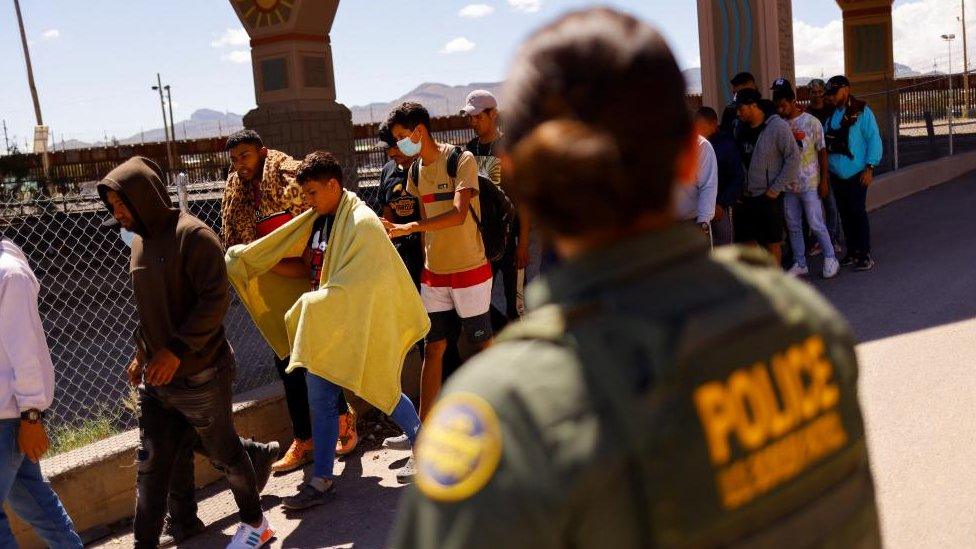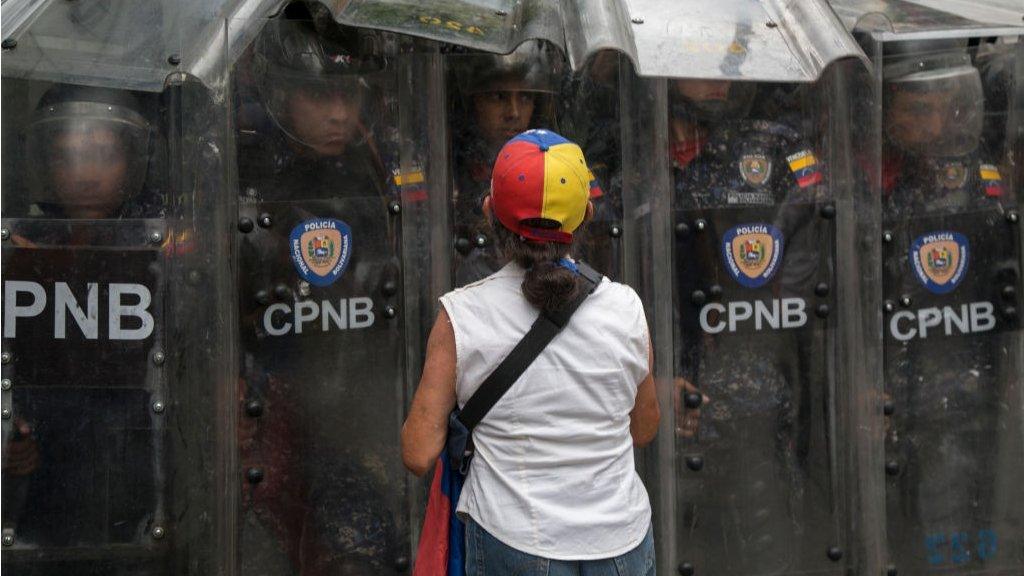US and Mexico make deal to ease Venezuela migration
- Published

The US and Mexico have agreed to a plan that allows some Venezuelan migrants to enter the US - but those who arrive illegally will be sent back to Mexico.
It is hoped the deal will ease pressure at the US-Mexico border, where a steady flow of Venezuelans continues to arrive as they flee the crisis-hit nation.
Starting immediately, flights will be arranged for 24,000 migrants to arrive in the United States.
More than six million people have left Venezuela in the past five years.
The exodus is one of the largest migrations in the world, fuelled by violence, food, fuel and medicine shortages, and repression by the government of President Nicolás Maduro.
It has seen people desperate to improve their lives walking thousands of miles along dangerous routes to try to reach the US-Mexico border, where they then try to enter illegally or claim asylum.
Under the new deal, which is effective immediately, the 24,000 eligible Venezuelan migrants - a tiny fraction of those who have fled - will be allowed to access the US by air, and stay for up to two years.
They must still be in Venezuela, and not have made the trek to the US-Mexico border, the US Department of Homeland Security said in a statement, external.
They will also need to have a person or organisation based in the US to provide financial support and back up their claim to be part of the programme.
Life after deportation: 'I am living the Mexican dream'
It will come as a huge relief to those who are set to benefit from it. In theory, they will be spared the exhausting and dangerous journey to the US border and instead will be able to fly into the country, where support measures are in place.
However, one major policy shift is that any undocumented Venezuelans who cross the southern border now face expulsion to Mexico - where previously, authorities usually did not accept expulsions of Venezuelans.
This is a part of a controversial Trump-era policy called Title 42, that allows the US to swiftly expel undocumented migrants, thus taking away their chance to claim asylum. It was brought in during the pandemic to help prevent the spread of Covid-19 in holding facilities, officials said.
Until now most Venezuelans who crossed into the US were not turned back - instead they were temporarily allowed in and had the chance to apply for asylum.
Now, Venezuelans found to have entered the US illegally - of which there are many thousands - could be sent to Mexico.
The US and Mexican governments have said the policy is designed to discourage people from making the perilous trek across South America and Mexico - which they have been doing in record numbers over the past year as Venezuela's economic and political situation worsens.
The programme is based on a similar US model called Uniting for Ukraine, which offered safe haven to more than 100,000 Ukrainians who fled their country after Russia invaded earlier this year.
The so-called "humanitarian parole programme" has been launched with the US midterm elections looming in November.
The Biden administration is undoubtedly hoping the idea of helping Venezuelans who are fleeing poverty, political turmoil and violence will play well politically, especially if it is combined with also expelling thousands who crossed the southern border illegally.
However, with the vote so close, it may have a limited impact, and in the meantime, many thousands of desperate and tired Venezuelan migrants are caught in the middle.

The BBC uses the term migrant to refer to all people on the move who have yet to complete the legal process of claiming asylum. This group includes people fleeing war-torn countries, who are likely to be granted refugee status, as well as people who are seeking jobs and better lives, who governments are likely to rule are economic migrants.
Related topics
- Published10 February 2021

- Published12 August 2021

- Published17 May 2021
